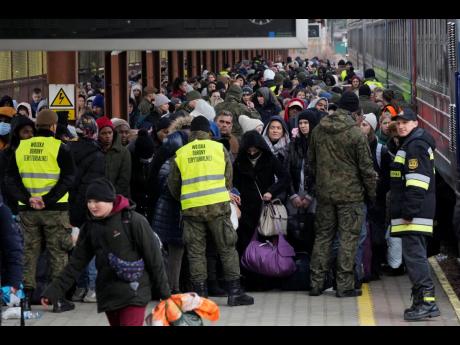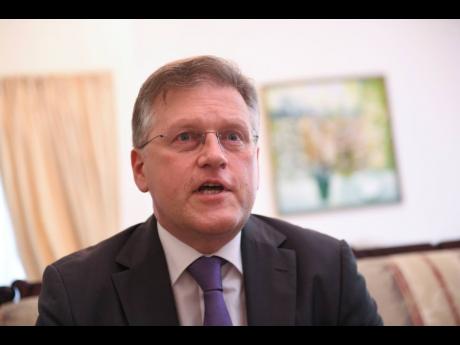NUKE THREAT
War-weary Jamaicans reach Polish border as Putin activates nuclear deterrent
Less than 48 hours before Russian President Vladimir Putin ordered the military to activate its deterrence forces, which include nuclear weapons, Moscow’s man in Kingston sought to downplay a nuclear conflict as the war in Ukraine escalates.
Putin’s assertion – viewed by Moscow as insurance but seen as a threat by the West – has served to inflame tensions in Eastern Europe as NATO and other allies seek to tighten the noose on Russian aggression by cutting off its link to the global payment system, closing airspace to Russian planes, and pledging artillery to Ukraine’s military and civilian fighters.
“I don’t think that in the modern world someone would use nuclear weapons, but yes, Russia, the United States, and other countries officially possess nuclear weapons, but it has always served in history as a deterrent,” Russian Ambassador Sergey Petrovich said in a Gleaner interview at his Norbrook Drive residence in Kingston.
John Rapley, professor at the Johannesburg Institute for Advanced Study, has cautioned, however, that the isolated Putin administration has grown increasingly hard to assess.
“It seems incredible that Russia would go so far, but Putin’s behaviour has become unpredictable, and he may be growing desperate given that the campaign is not going as planned,” Rapley told The Gleaner on Sunday.
Fear of nuclear deployment remains heightened as 24 Jamaican students who left Lviv from Kharkiv remain in danger after trudging in the Ukrainian cold on a 20-kilometre (12.4-mile) trek after the bus in which they were travelling was blocked by enraged persons for “overtaking”.
They reached an agreed Poland border point where they are expected to be met by Jamaica’s chargé d’affaires Deniese Sealey in Berlin, and a Polish contact, Kamina Johnson Smith, the foreign minister, said in a video message on Sunday afternoon.
But getting them to safety even from there is expected to be a Herculean task fraught with danger as thousands of refugees jostle to escape a conflict that is expected to become more explosive in coming days.
Johnson Smith disclosed that a few of the students had fallen ill.
“Regrettably, two of the students are not feeling well – one in particular because of the cold. She’s currently getting care in an ambulance now at that border crossing point,” she disclosed.
Petrovich was bullish in his defence of his Government, citing the 2014 coup d’ é tat of Viktor Yanukovych, a pro-Russia president of Ukraine, as the flame that triggered the nearly eight-year conflict between both states.
Since then, successive Ukrainian presidents have expressed their interest in joining institutions such as NATO and the European Union, overtures that Petrovich views as an “anti-Russian policy”.
Petrovich also cited Russian grievances that many ethnic Russians in the Donbas region have faced discrimination and abuse, with Putin calling for the “denazification” of Ukraine and accusing the current administration of genocide.
“The new authorities started to violate the rights of the Russian-speaking population by banning the Russian language. They introduced the ban to speak Russian, and they started to close the Russian-speaking schools,” said the ambassador.
That comment is in reference to the passage of a language law in 2019 under Yanukovych’s successor, Petro Poroshenko, which aimed to cement Ukrainian as the primary language for communication in businesses, schools, and the media.
That has been a primary source of contention for many Russian speakers living in the Donbas, said Petrovich.
But those claims of genocide and ethic discrimination have been widely denied by Ukraine President Volodymyr Zelenskyy and Western allies, who have accused Moscow of spinning a narrative of misinformation and propaganda to justify Putin’s nostalgia for a resurrected Soviet Union.
Petrovich insists that Russia has two goals: protection of the civilian population in the two breakaway republics of Donbass, and the demilitarisation of Ukraine.
Since 1997, NATO has expanded eastward, with the organisation growing from 16 members to 30 nation states. Now, NATO comprises former Soviet allies such as Poland and Hungary and former Soviet republics like Latvia and Estonia.
“The decision to start the military operation in the Ukraine was a very uneasy decision for the Russian president. He was compelled to make such a decision,” said Petrovich.
“Russia will not like to be circled by hostile countries. It has a desire for every country to have friendly neighbours in its borders.”
But the Russian ambassador’s claim of victimhood is unlikely to gain the sympathy of a West that views Putin as increasingly cynical – and dangerous.
And the threat days ago by Russia’s foreign affairs ministry of “serious political and military consequences” for Finland and Sweden is expected to galvanise more resistance by NATO and its allies.


